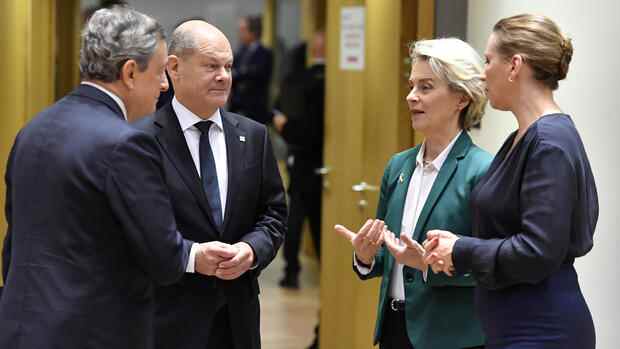The EU Commission (here Commission President Ursula von der Leyen with Mario Draghi, Olaf Scholz and Mette Frederiksen) should examine “common European solutions”.
(Photo: dpa)
Brussels It was one of the hottest questions in the long night of the EU summit: do Europeans need a new EU fund to finance the fight against high energy prices? In the early hours of the morning, at the urging of Italian Prime Minister Mario Draghi, the 27 heads of government agreed on a work assignment for the EU Commission to examine “common European solutions”.
The vague formulation leaves all possibilities open. Chancellor Olaf Scholz and Dutch Prime Minister Mark Rutte emphasized that there are already several billion pots at EU level. This is not enough for some of their colleagues from southern Europe, they are demanding additional aid for financially weak countries.
The debate focuses on three sources of funding:
- EU budget: Commission President Ursula von der Leyen announced last night that an agreement had been reached to reallocate up to 40 billion euros in unused funds from the EU’s last multiannual financial framework (2014 to 2020). The money is intended to help member states to subsidize the high energy prices for their households and companies. The funds come from the cohesion fund, which the EU uses to promote structurally weak regions. They are always paid out with some delay. According to which key they will be distributed is still unclear. In addition, there would still be 350 billion euros in cohesion funds in the current multi-year financial framework (2021 to 2027), which could theoretically be used to fight the energy crisis.
- Corona Recovery Fund (NextGenEU): The EU Council had already decided in spring to reallocate 200 billion euros from the 800 billion euro reconstruction fund for the current energy crisis. The fund, launched in 2021, took on joint EU debt for the first time in order to mitigate the economic consequences of the pandemic. Funds for energy infrastructure, renewable energies and efficiency measures are to flow under the heading “RepowerEU”. Most recently, the EU Council had increased this sum to 220 billion euros. However, the money is not yet available because the voting procedure between the European Parliament and the EU Council is still ongoing. Von der Leyen expressed the hope that an agreement would be reached by the end of the year. On top of that, there are still more than 400 billion euros in the Corona fund that have not yet been paid out to the member states.
- New EU fund: A few weeks ago, EU Commissioners Thierry Breton and Paolo Gentiloni called for a new fund based on the Sure program from the corona crisis. Sure was an EU fund from which cheap loans amounting to one hundred billion euros had flowed to the member states to finance short-time work. Countries that have to pay high interest rates for new loans on the capital market were able to get money more cheaply via Sure due to the better EU conditions. The southern Europeans are now demanding a new edition of Sure.
Top jobs of the day
Find the best jobs now and
be notified by email.
Commission President von der Leyen said member states now have several ways to help their businesses and households with energy prices. In addition to the funds from the EU budget and the reconstruction fund, there is also the possibility of skimming off and redistributing excess profits from the energy companies. This was recently decided by the EU.
In addition, the Commission will decide next week to relax the competition rules so that governments can more easily distribute state aid to companies, said von der Leyen.
Scholz and Rutte against new funds
The heads of government of Germany, Austria, the Netherlands, Finland and Sweden rejected a new EU fund in the discussion at the summit. “If you add everything up, there are around a thousand billion in different pots,” says an EU diplomat. The money from the Corona fund cannot be used directly to subsidize gas prices because, according to the legal basis, it can only be used for investments. But it could give national governments some leeway in their budgets.
The Dutchman Rutte said that first of all it is about using all existing funds. In addition, it is now being examined what may be necessary afterwards. “My impression is that so much money is available that we will never get to this point.” Chancellor Scholz also emphasized that the focus is on the existing pots. “You can focus on those, and after that the debate will continue.”
Next, the finance ministers in the Eurogroup will deal with the topic. There, however, it is not expected that the negative attitude of Berlin and The Hague will change fundamentally.
More: EU wants to work on gas price cap.
